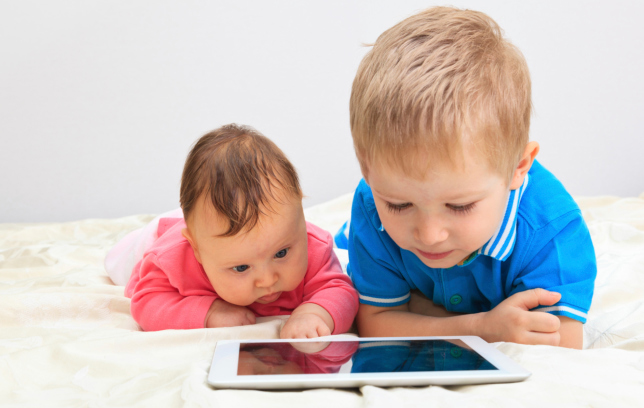The pacifier just went digital: Parents are passing off tablets to kids as young as 6 months old and using the gadgets to put children to bed, keep them calm, and entertain them, finds a new study from the Einstein Healthcare Network.
Doctors found about half of the kids in the study under 1 year old had watched TV on a mobile device.
In addition, 36 percent had spent time scrolling down a screen, 15 percent used applications, and 12 percent played games.
Guilty? Experts can’t yet say what’s definitively good or bad when it comes to youngsters on these devices. But as of now, there are no proven benefits to very young children using such products, says study author Hilda Kabali, M.D.
“Mobile devices are ubiquitous and are used as the modern ‘screen,’” Dr. Kabali says.
In this sense, scientists and doctors can speculate that these gadgets may have the same negative effects on children as traditional TV, like delays in language development, increased sedentary behaviors, and nearsightedness, she says.
In fact, the American Academy of Pediatrics recommends that kids under 2 should steer clear of TV and other entertainment media.
Per the organization’s website, “a child’s brain develops rapidly during these first years, and young children learn best by interacting with other people—not screens.”
Here’s why you might want to keep your favorite tech toy out of your tykes’ reach.
11 Smart Things You Should Definitely Teach Your Kids
You Could Raise a Quiet Kid
A recent study in the journal Infant Behavior and Development found that viewing TV increased the risk of delayed cognitive, motor, and language development in children under 2.
And the more time glued to the tech, the worse the problems. Researchers suspect that as kids become absorbed in a device, parents zone out, and thus your detachment plays a role in their lack of development.
Do this instead: Have one-on-one conversations instead of letting the tablet do the talking. Chat your child up or read bedtime stories as if he or she can respond.
The longer and the more realistic the sentences, the better for baby brainpower, finds a study from Stanford University.
Your Baby Could Be Lazy
Some research suggests that becoming sucked into devices can lead your brain to release the chemical dopamine. Dopamine is released when you’re seeing something intriguing, and it can also signal reward.
But building a tech habit from a young age could lead kids to seek reward from such devices, meaning they spend less time with other kids and more time on the couch.
Sedentary behaviors also displace other activities, Dr. Kabali says, which is why viewing habits tend to be linked to obesity rates.
Kindergarteners who watch even an hour of TV a day are at an increased risk of obesity, according to a recent study from the University of Virginia.
Do this instead: Build a better habit they’ll learn to love by packing the car and getting away from the TV.
Five days of face-to-face interactions outdoors at a camp (with no screens around) boosted kids’ recognition of non-verbal emotional cues, found a study in the journal Computers in Human Behavior found.
You Might Make a Bully
Fussy babies watch more TV, according to a 2014 study in Pediatrics. That could be because tech devices can mess with sleep, researchers say.
But other studies show that an increased amount of screen time as your baby grows is correlated with behavioral problems down the line as well.
Do this instead: Play with your kid in real life—starting from day one.
That sounds simple, but here’s why it matters: Kids whose dads are more positively engaged with them at 3 months have fewer behavioral problems at 12 months, per a University of Oxford study.
The 22 Most Annoying Things about Your Kids
You May Need to Find a Better Vision Plan
Nearsightedness rates are growing all over the world—including the U.S.—at alarming rates. And while eyesight has a lot to do with genes, some experts believe that tablet use and poor vision are intricately linked.
This could be due to how close children hold devices to their faces, and also a damaging level of engagement on developing eyes.
Do this instead: Get the heck outside! One Australian study found that the less time young children spent outdoors, the more likely they were to become nearsighted.
Scientists aren’t sure why, but some think that UV light could be protective to your eyes—especially young, developing eyes.















